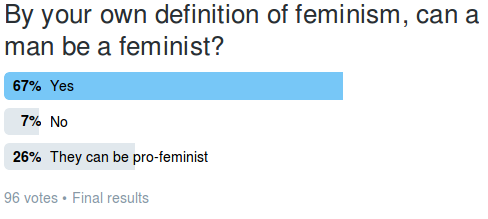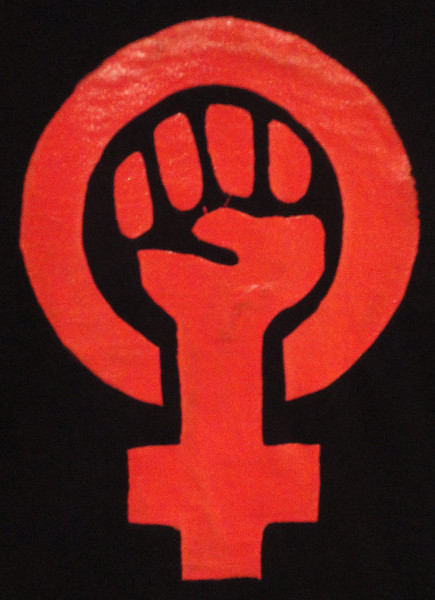Quite a ramble – perhaps think of this as a first draft of a far better post!
There have been many experiences and people that I’ve met on my journey that have been influential. However, there are four that stand out.
Values
The first I cannot explain. From every since I can remember I have had a strong sense of justice – that there should be equality and equity in the world. Over the years I’ve been involved in many issues where I’ve seen injustice. It just feels like part of my make up in the same way that I have brown hair and big ears. This part of me didn’t directly lead me to feminism, though it meant I had a framework in which women’s rights could easily fit.
ACADEMIC The second hugely significant factor in my journey was my degree. Quite by accident in many ways I ended up studying Third World Development at Coventry University. Before I started this course I would have called myself anti-sexist – seeing my role as one about my behaviours. For example, it’s my responsibility not to objectify women; ‘birds’ is a patronsing term; I have no right to hit a women because she burnt the dinner.
Unknown to me before I started my degree, the three main lecturers applied a gender lens to their studies which fed through into their teaching. A gender lens in one in which studies would ask questions such as is there a difference in the effects of something (say a famine, a macro-economic policy, or cultural norms) on men compared to women. Time and time again this should that women faired worse than men, and they had far fewer opportunities to improve their lives than men did.
Even when women did have opportunities, it was also clear that they commonly used these in different ways. A good example is in the somewhat simplistic (and problematic) phrase of “give a man a fish and feed him for a day, give him a fishing rod and feed him for life”. Many studies have suggested a different way of expressing the first clause: “give a man a fish and feed him for a day, give a woman a fish and feed a family for a day”.
Faced with such overwhelming evidence, it became pretty clear that it wasn’t just about men being sexist (though that is often part of the problem). There was something deeper going on that meant the same pattern of women being more disadvantaged then men going on. This led me to the conclusion that my anti-sexist approach, whilst still being the right thing for me to do, was not going to be effective in and of itself to creating a gender just world. The systemic causes of the problem also have to be changed. These include legal structures & processes, cultural norms, workplace practices – almost everything that you can think of. Above all, that men tend have more power (soft and hard) than women needs to change. I think of this as my move from my anti-sexist outlook to a feminist outlook. That’s enough about my academic journey. The first thing on my journey was something that happened before my degree, though it was my reflections during and after university that had the greatest impact on me. My family life and upbringing.
Family
Like most children, I thought my upbringing was the norm and didn’t analyse it at the time. And in many ways if was the norm. Though reflection later in life, together with my ‘feminist framework’, really brought home the realities of a gender unjust world.
When I was a tiny wee one, I think my family would have fallen into today’s categories of just about managing. We got by, though if something happened like the washing machine breaking down money would be really tight. Over the course of my childhood this changed to (in my mid-teens) something along the lines of comfortably off. This was done by my parents working their socks off – my dad in traditional paid employment, my mum by being self employed and working from home.
And this is where, with hindsight, I see the first element of gender imbalance. My dad would tootle off to the office to earn a crust. He had to work hard, and he did, in a nine to five (and them some) job. My mum would make me and my bro our pack lunch and pack us off to school, then get back to the house and work (making clothes for people if you’re interested).
Nothing massively different so far. Though it all changes when me and my bro get home from school. My dad’s still in the office, so mum stops working and becoming a mum again. She listens to my 100 mile an hour monologue about what’s I’ve enjoyed about a great day, and supports the tears and crises of a bad day. All with undivided love and attention.
What I realised later in life was that, whilst giving me and my bro the attention we needed, there must have been some part of her that was thinking “Shit, I’ve got so and so coming for a dress fitting tomorrow and the dress still needs stitching together. And the kids will be hungry soon so I’ll have to cook dinner”.
So she’d find us something constructive to do – a book to read, a picture to draw – almost anything but plonk us in front of the tellybox (that was strictly rationed), so that we’d be happy and she could get on with work.
Dinner would be at 6:30. Dad’s sad he’ll be home by then. Always made from scratch (much cheaper and better that an M&S ready meal). I admire my mum’s creativity that she taught me and my bro that chopping veggies was a fun activity and in no way a chore! But then my dad would be unavoidably delayed, so it would be 7:00. Then 7:30. By 7:15 I’m bored, hungry and sulky. So my mum stops work to give me attention. By 8:00 we eat – me, my mum and brother. By 10:00 I go to bed. Mum’s done the washing up and gone back to work a time ago. There’s no sign of my dad. Like many days, I’ll wake him in the morning to say goodbye before I go to school, and not see him again until I do the same the following morning.
So this family stuff is to give you a little background to the story I’m now going to tell that. At the time, I thought this story was just funny. Later on I realised how it exemplified one part of a gender unjust world.
I was probably 13, and my parents were are of my school’s PTA (Parent Teacher Association – do they still have them?). They had an annual Christmas do – a wine and cheese type thing. I remember the evening well. My mum wore make up. I couldn’t remember another time I’d seen her in make up. Off her and my dad went. I was in bed long before they came back.
It was a couple of weeks later that the funny story came out. My mum had got so drunk at the event that she walked into a lamppost and fell over. And let’s face it, a drunk person walking into a lamppost and falling over is funny (and painful if you’ve ever done it – which I have!). For many years I laughed at this, and teased my mum about it. What an idiot!
Years later, and after talking to many people (and admittedly making some assumptions), I have a very different view of what happened. And I think it’s a classic example of a gender divide of which I was completely unaware of at the time.
I was not used to seeing my mum with make up because she had not had a social night out where she could let her hair down for years. She didn’t have time – she was in the classic ‘double shift’ situation of many working mums – she had one job to earn money, and another job to raise children. Once these were done there was just about enough time in a day to sleep. Nothing else.
Having a very rare opportunity to have a night out, she really went for it on the wine. If you’ve not had a night out for years, and don’t know when the next one will be, you’re gonna go all out aren’t you? I know I would. But you’ve not been out for years and don’t drink much, if at all, at home. So a couple of glasses of wine and you’re gonna be pretty pissed – especially compared to others that might be more used to it.
Of course my dad could get my mum home, and remember the evening well enough to relate the tale. Because a significant proportion (though not all) of why he wasn’t around for family dinners was because he went to the pub with his office mates. Partly networking required for the job, partly fun, partly cos while loving me and my bro he doesn’t really like children. And, most significantly in the context of this blog, he was earning the big money. So that was his main contribution to the family sorted.
My mum died when I was 17. I have a good relationship with my dad, though I would not describe it as especially emotionally open – especially when it comes to looking at the past. So I may be wrong on some of this. That said, it does seem to be a classic example of the different roles of men and women, and how women are worse off.
Friends
The fourth part of my journey is friends. I am privileged to have many friend with which I can talk about my views of feminism. And that are willing to share their views. All views are shared between us in a non-judgmental way in which a challenge is not a criticism, rather a learning experience.
Conclusion
My journey to feminism continues. I want to live in a gender equal work. There’s much work for me to do on a personal. Perhaps for you too? And much work for all of us on changing the structural and systemic things that create our world in which women typically have fewer rights and power than men.
Herein ends my blog. It’s way too long, and a brain dump. I make no apologies for thinking out loud and sharing my experiences. I want to write something more coherent in the future. I’ll reflect on this post, and would really welcome your views.
Last word
Can a man be a feminist? Here's what Twitter thinks...


